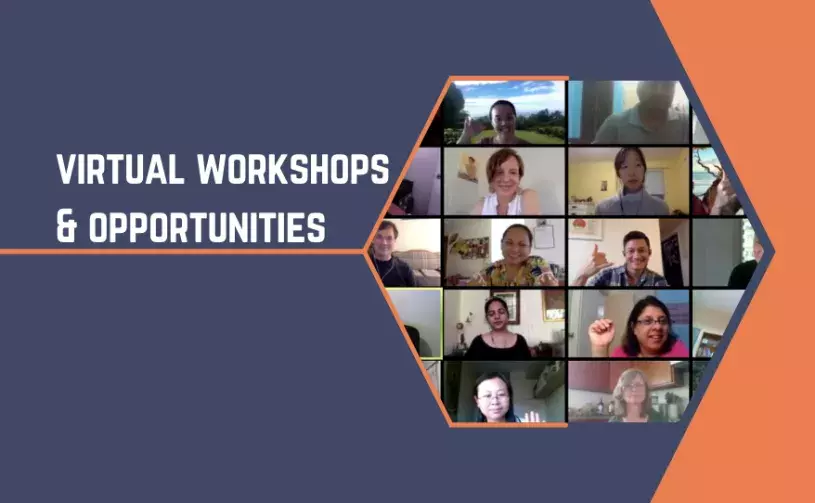
The Leadership Program series of online workshops, certificates, and programs are designed to bring together global participants for informative and interactive sessions with the goal of professional development. Our online offerings consist of leadership tools and methods, stories of leadership in various capacities, and highlighting alumni expertise and achievements in addition to many others. Register to join our current virtual events by clicking the button. Any questions can be directed to us at [email protected].
Virtual Workshops & Opportunities
Follow us on Facebook and Instagram to stay up-to-date on future online opportunities!
December 2022 Virtual Workshops
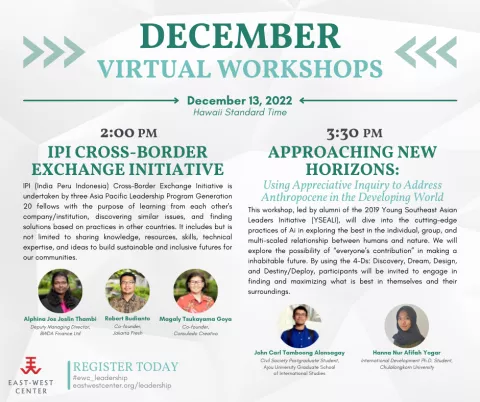
IPI (India-Peru-Indonesia) Cross-Border Exchange Initiative
Robert Budianto, Alphina Jos Joslin Thambi, Magaly Tsukayama Goya
Tuesday, December 13, 2:00-3:00 PM Hawaii Standard Time (HST)
IPI (India Peru Indonesia) Cross-Border Exchange Initiative is undertaken by three APLP G20 fellows with the purpose of learning from each other's company/institution, discovering similar issues, and finding solutions based on practices in other countries. It includes but is not limited to sharing knowledge, resources, skills, technical expertise, and ideas to build sustainable and inclusive futures for our communities. Alphina is empowering South Indian women through financial inclusion. Magaly is empowering Japanese immigrants through lending capital for their SMEs. Robert is empowering small farmers by value-adding their produce through social certification. The leaders of these three initiatives share similarities. First, they all come from developing countries but the way they empower their communities are different. Another is that they worked with one group of marginalized and excluded people, but then realized there were ways to help others: financial inclusion for immigrants in India; supporting small farmers in Peru add to their produce to compete in the global market; or expanding financial inclusion to women in villages throughout Indonesia to build their livelihoods. That's the beauty of a cross-border exchange initiative. It can give you ideas and possibilities of proven projects in one country that can be adapted to another country.
Approaching New Horizons: Using Appreciative Inquiry to Address Anthropocene in the Developing World
John Carl Tamboong Alonsagay, Hanna Nur Afifah Yogar
Tuesday, December 13, 3:30-4:30 PM Hawaii Standard Time (HST)
Appreciative Inquiry (Ai) is an organizational development model that is a strengths-based approach and an alternative way to address contemporary problems. Ai emphasizes the mindsets shift to redesign and redevelop strategic visions by spotlighting what is the best in engaging and directing the future. In this epoch, the Anthropocene, people are more likely to experience unpredictable phenomena as causal effects of human activities. It includes social-ecological issues, “development” agendas, legal-political issues, and leadership actions. This workshop will dive into the cutting-edge practices of Ai in exploring the best in the individual, group, and multi-scaled relationship between humans and nature. We will explore the possibility of “everyone’s contribution” in making a inhabitable future. By using the 4-Ds: Discovery, Dream, Design, and Destiny/Deploy, participants will be invited to engage in finding and maximizing what is best in themselves and their surroundings.
Gen2 - Virtual Alumni Summit

Gen2: Leadership in Critical Issues
December 6-8, 2022 Hawaiian Standard Time
Gen² (Generation squared), a generative space across generations, is a virtual summit of the East-West Center leadership alumni which brings together people across generations. This generative space showcases and celebrates the variety of diversity in our community. Gen² offers peer-to-peer collaboration, professional development, leadership learning, inspiration and opportunities to connect.
Watch our 2021 Distinguished Leaders Lecture Series
Word Baskets and Witness Bearing:
A Talk Story with Julian Aguon and Kathy Jetñil-Kijiner
April 6, 2021, 7:00-8:00 PM HST
Live Stream Recording
Humane Artificial Intelligence and Our Collective Future:
A Conversation among Dr. Peter D. Hershock and EWC Humane AI Fellows, Dr. Emilie Parry and Dr. Andrew Uhl
May 6, 2021, 4:00-5:30 PM HST
Live Stream Recording
2021 Certificate Opportunities

'What’s Going On?' is a five-week course designed to enhance your understanding of core regional (Asia-Pacific) issues and global trends, and how they impact your area of interest. Each week, we will take a deep dive into specific themes and some signals of change in those areas. We will also use the Covid-19 pandemic and the climate emergency as a lens to understand them.
About the Certificate Series
This series will cover the following themes:
- Week One - September 16: Mis/disinformation
This session takes a deep look at how widespread is the crisis of mis/disinformation. How do we sift through the barrage of information available to us? Who are our trusted sources? How is the landscape changing for where and how we receive information? We will also look at the global trend of misinformation during the Covid-19 pandemic and how it can prepare us for the climate emergency upon us. - Week Two - September 23: Demographics
Are you living in an aging society, or one that’s reaping the benefits of its demographic dividend? We take a look at how the generational shift is impacting our region. How can generational theory help us understand how different generations relate to global issues, such as climate change? Can this knowledge help us be better leaders for our community? - Week Three - September 30: Work
The Covid-19 pandemic has led to fundamental changes in how we work. In this session, we examine how this has happened and what the future of work looks like. We question why we work to begin with? How many hours a week do we need to work? Is your job even going to exist 50 years from now? We also look at universal basic income as a new economic model to offset the losses from automation. - Week Four - October 7: Circular Economy
Floating islands of trash in the Pacific Ocean and heatwaves in Canada should make it clear that our economic models need to change dramatically if we want to survive climate change. In this session, we take a look at how innovative models, such as circular economy and doughnut economy, answer the call for sustainable economic practices. How fragile are global supply chains in the face of raging pandemics and dwindling fossil fuel demand? How are various industries taking up sustainable practices? - Week Five - October 14: Final Deliverables
In Session Five, the last session of this series, we will review the final deliverables. Participants have the option of choosing one of four mediums for submitting and sharing their final project for this course.
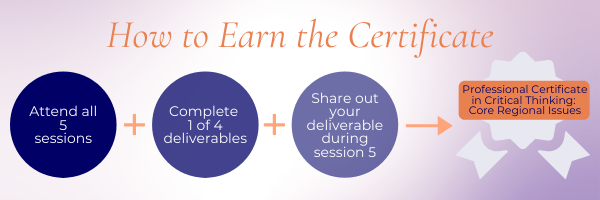
Deliverables:
- Option 1: Submit to the LP team a written reflection of no more than 600 words answering one or all of the questions below.
- Due: Before Session Five
- Option 2: Prepare an individual presentation of no more than 5 minutes in which you answer the questions below. This presentation will be delivered live during the last session of the course.
- Due: During Session Five
- Option 3: Make a video of yourself (no more than 5 minutes) and submit to the LP team your answers to the questions below.
- Due: Before Session Five
- Option 4: Write and share a blog post or a LinkedIn Article answering the questions below.
- Which of the broad global trends examined in this course applies directly to my work?
- How does it impact my work?
- What actions can I take to prepare for this future?
- What has this course made me curious about?
- Due: Before Session Five

This five-week course will explore the intersection of peacebuilding and leadership by engaging with a four-quadrant peace leadership model developed by youth from Bangladesh, Cambodia, Myanmar, and Vietnam. You’ll have the opportunity to learn the basics of several peace leadership skills: nonviolent communication, circle-keeping, and conflict assessment and connect these skills to contemporary issues such as identity, technology, the pandemic, climate change, and political polarization. Peace leadership is practice-based, holistic, reflexive, and highly contextual. As such, come prepared for an interactive and hands-on learning experience.
About the Certificate Series
This series will follow the following themes:
- Week One - October 4: Introduction & Peace Within
What is peace leadership and how does it relate to me? This session will introduce the topic of peace leadership, looking at examples of peace leadership from around the globe. We’ll learn about a four-quadrant peace leadership model developed by Southeast Asian youth, which will be used throughout this course. We’ll then dive into the first quadrant, leading peace within. We’ll consider how our stories, identities, and self-knowledge, including our positionality, form a foundation for honing our peace leadership wisdom and skills. - Week Two - October 11: Interpersonal Peace
What does peace leadership look like in the interpersonal context? This session will explore how we can deepen our relationships with others and transform conflicts that arise in our lives. You’ll learn the basics of nonviolent communication and have a chance to practice it with your classmates. - Week Three - October 18: Sustaining Peaceful Communities
In this session we’ll turn our attention to communities. What constitutes peace in a community, and how can we make substantive contributions towards sustainable peace in communities? Participants will learn about restorative justice and circle-keeping processes and how they can be utilized as a tool for strengthening communities of practice. - Week Four - October 25 - Leading Peace in the World
Building off of our peace leadership foundation from the first three sessions, we’ll now shift our gaze to the greater world that we inhabit and share. This session will introduce conflict assessment tools, which can be used to diagnose and potentially intervene in conflicts. - Week Five - November 1- Reflection & Final Deliverables
The final class will offer an opportunity for participants to share their final deliverables. This session will also provide space for reflection and critical engagement of the concepts, framing, and practices of peace leadership explored in the course.
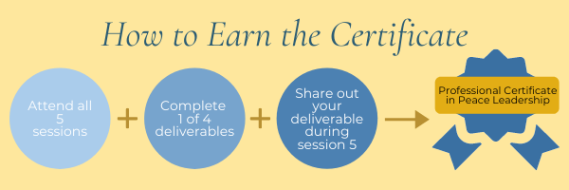
Deliverables:
- Option 1: Complete a personal peace leadership plan using the four-quadrant model developed in this course. You’re encouraged to visually present the actions you plan to take in each of the quadrants. Due Before Session 5
- Option 2: Complete a conflict assessment using one of the conflict assessment tools that we introduced in Session 4. You can choose to focus on any conflict you like, at any level of society (i.e. individual, community, national/international). Due Before Session 5
- Option 3: Try using nonviolent communication in your daily life and then write a reflection (400-500 words) on your experience including what you learned and any intentions you may have for using nonviolent communication in the future. Due Before Session 5
- Option 4: Make a brief video (1-3 min) of yourself articulating your own personal theory of peace leadership. Draw from your own experiences and the wisdom of your own community, however you may define that. Due Before Session 5
2021 North Pacific Alumni Virtual Summit
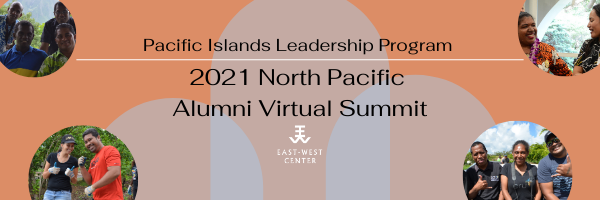
Due to Covid-19, we are unable to hold the 2021 North Pacific Alumni Summit in-person as originally planned. Instead, we will co-produce a Virtual Summit (online), which means – happily – everyone in the PILP network who wants to join can join. Of course, we would always rather meet in-person, but since this is not possible at present, we will leverage this opportunity to reconnect with as many of you as possible in an interesting, enjoyable and productive way. East-West Center staff have been working from home for the past nine months and, like you, we now have valuable experience running virtual events and interacting online.
We will meet for two sessions per day during work hours with an extended break in-between (excluding the break, that’s approximately 4 hours per day). The first session, hosted by the EWC, will feature advanced leadership training linked to the workplace. After the break, the second session, hosted by PILP alumni in the North Pacific, will feature local Distinguished Leaders from Palau, RMI and FSM discussing local opportunities and challenges which affect the Pacific region as a whole. We welcome ideas and input on all aspects of the event.
The Leadership Program series of online workshops, certificates, and programs are designed to bring together global participants for informative and interactive sessions with the goal of professional development. Our online offerings consist of leadership tools and methods, stories of leadership in various capacities, and highlighting alumni expertise and achievements in addition to many others. Register to join our current virtual events by clicking the button. Any questions can be directed to us at [email protected].
Virtual Workshops & Opportunities
Follow us on Facebook and Instagram to stay up-to-date on future online opportunities!
December 2022 Virtual Workshops

IPI (India-Peru-Indonesia) Cross-Border Exchange Initiative
Robert Budianto, Alphina Jos Joslin Thambi, Magaly Tsukayama Goya
Tuesday, December 13, 2:00-3:00 PM Hawaii Standard Time (HST)
IPI (India Peru Indonesia) Cross-Border Exchange Initiative is undertaken by three APLP G20 fellows with the purpose of learning from each other's company/institution, discovering similar issues, and finding solutions based on practices in other countries. It includes but is not limited to sharing knowledge, resources, skills, technical expertise, and ideas to build sustainable and inclusive futures for our communities. Alphina is empowering South Indian women through financial inclusion. Magaly is empowering Japanese immigrants through lending capital for their SMEs. Robert is empowering small farmers by value-adding their produce through social certification. The leaders of these three initiatives share similarities. First, they all come from developing countries but the way they empower their communities are different. Another is that they worked with one group of marginalized and excluded people, but then realized there were ways to help others: financial inclusion for immigrants in India; supporting small farmers in Peru add to their produce to compete in the global market; or expanding financial inclusion to women in villages throughout Indonesia to build their livelihoods. That's the beauty of a cross-border exchange initiative. It can give you ideas and possibilities of proven projects in one country that can be adapted to another country.
Approaching New Horizons: Using Appreciative Inquiry to Address Anthropocene in the Developing World
John Carl Tamboong Alonsagay, Hanna Nur Afifah Yogar
Tuesday, December 13, 3:30-4:30 PM Hawaii Standard Time (HST)
Appreciative Inquiry (Ai) is an organizational development model that is a strengths-based approach and an alternative way to address contemporary problems. Ai emphasizes the mindsets shift to redesign and redevelop strategic visions by spotlighting what is the best in engaging and directing the future. In this epoch, the Anthropocene, people are more likely to experience unpredictable phenomena as causal effects of human activities. It includes social-ecological issues, “development” agendas, legal-political issues, and leadership actions. This workshop will dive into the cutting-edge practices of Ai in exploring the best in the individual, group, and multi-scaled relationship between humans and nature. We will explore the possibility of “everyone’s contribution” in making a inhabitable future. By using the 4-Ds: Discovery, Dream, Design, and Destiny/Deploy, participants will be invited to engage in finding and maximizing what is best in themselves and their surroundings.
Gen2 - Virtual Alumni Summit

Gen2: Leadership in Critical Issues
December 6-8, 2022 Hawaiian Standard Time
Gen² (Generation squared), a generative space across generations, is a virtual summit of the East-West Center leadership alumni which brings together people across generations. This generative space showcases and celebrates the variety of diversity in our community. Gen² offers peer-to-peer collaboration, professional development, leadership learning, inspiration and opportunities to connect.
Watch our 2021 Distinguished Leaders Lecture Series
Word Baskets and Witness Bearing:
A Talk Story with Julian Aguon and Kathy Jetñil-Kijiner
April 6, 2021, 7:00-8:00 PM HST
Live Stream Recording
Humane Artificial Intelligence and Our Collective Future:
A Conversation among Dr. Peter D. Hershock and EWC Humane AI Fellows, Dr. Emilie Parry and Dr. Andrew Uhl
May 6, 2021, 4:00-5:30 PM HST
Live Stream Recording
2021 Certificate Opportunities

'What’s Going On?' is a five-week course designed to enhance your understanding of core regional (Asia-Pacific) issues and global trends, and how they impact your area of interest. Each week, we will take a deep dive into specific themes and some signals of change in those areas. We will also use the Covid-19 pandemic and the climate emergency as a lens to understand them.
About the Certificate Series
This series will cover the following themes:
- Week One - September 16: Mis/disinformation
This session takes a deep look at how widespread is the crisis of mis/disinformation. How do we sift through the barrage of information available to us? Who are our trusted sources? How is the landscape changing for where and how we receive information? We will also look at the global trend of misinformation during the Covid-19 pandemic and how it can prepare us for the climate emergency upon us. - Week Two - September 23: Demographics
Are you living in an aging society, or one that’s reaping the benefits of its demographic dividend? We take a look at how the generational shift is impacting our region. How can generational theory help us understand how different generations relate to global issues, such as climate change? Can this knowledge help us be better leaders for our community? - Week Three - September 30: Work
The Covid-19 pandemic has led to fundamental changes in how we work. In this session, we examine how this has happened and what the future of work looks like. We question why we work to begin with? How many hours a week do we need to work? Is your job even going to exist 50 years from now? We also look at universal basic income as a new economic model to offset the losses from automation. - Week Four - October 7: Circular Economy
Floating islands of trash in the Pacific Ocean and heatwaves in Canada should make it clear that our economic models need to change dramatically if we want to survive climate change. In this session, we take a look at how innovative models, such as circular economy and doughnut economy, answer the call for sustainable economic practices. How fragile are global supply chains in the face of raging pandemics and dwindling fossil fuel demand? How are various industries taking up sustainable practices? - Week Five - October 14: Final Deliverables
In Session Five, the last session of this series, we will review the final deliverables. Participants have the option of choosing one of four mediums for submitting and sharing their final project for this course.

Deliverables:
- Option 1: Submit to the LP team a written reflection of no more than 600 words answering one or all of the questions below.
- Due: Before Session Five
- Option 2: Prepare an individual presentation of no more than 5 minutes in which you answer the questions below. This presentation will be delivered live during the last session of the course.
- Due: During Session Five
- Option 3: Make a video of yourself (no more than 5 minutes) and submit to the LP team your answers to the questions below.
- Due: Before Session Five
- Option 4: Write and share a blog post or a LinkedIn Article answering the questions below.
- Which of the broad global trends examined in this course applies directly to my work?
- How does it impact my work?
- What actions can I take to prepare for this future?
- What has this course made me curious about?
- Due: Before Session Five

This five-week course will explore the intersection of peacebuilding and leadership by engaging with a four-quadrant peace leadership model developed by youth from Bangladesh, Cambodia, Myanmar, and Vietnam. You’ll have the opportunity to learn the basics of several peace leadership skills: nonviolent communication, circle-keeping, and conflict assessment and connect these skills to contemporary issues such as identity, technology, the pandemic, climate change, and political polarization. Peace leadership is practice-based, holistic, reflexive, and highly contextual. As such, come prepared for an interactive and hands-on learning experience.
About the Certificate Series
This series will follow the following themes:
- Week One - October 4: Introduction & Peace Within
What is peace leadership and how does it relate to me? This session will introduce the topic of peace leadership, looking at examples of peace leadership from around the globe. We’ll learn about a four-quadrant peace leadership model developed by Southeast Asian youth, which will be used throughout this course. We’ll then dive into the first quadrant, leading peace within. We’ll consider how our stories, identities, and self-knowledge, including our positionality, form a foundation for honing our peace leadership wisdom and skills. - Week Two - October 11: Interpersonal Peace
What does peace leadership look like in the interpersonal context? This session will explore how we can deepen our relationships with others and transform conflicts that arise in our lives. You’ll learn the basics of nonviolent communication and have a chance to practice it with your classmates. - Week Three - October 18: Sustaining Peaceful Communities
In this session we’ll turn our attention to communities. What constitutes peace in a community, and how can we make substantive contributions towards sustainable peace in communities? Participants will learn about restorative justice and circle-keeping processes and how they can be utilized as a tool for strengthening communities of practice. - Week Four - October 25 - Leading Peace in the World
Building off of our peace leadership foundation from the first three sessions, we’ll now shift our gaze to the greater world that we inhabit and share. This session will introduce conflict assessment tools, which can be used to diagnose and potentially intervene in conflicts. - Week Five - November 1- Reflection & Final Deliverables
The final class will offer an opportunity for participants to share their final deliverables. This session will also provide space for reflection and critical engagement of the concepts, framing, and practices of peace leadership explored in the course.

Deliverables:
- Option 1: Complete a personal peace leadership plan using the four-quadrant model developed in this course. You’re encouraged to visually present the actions you plan to take in each of the quadrants. Due Before Session 5
- Option 2: Complete a conflict assessment using one of the conflict assessment tools that we introduced in Session 4. You can choose to focus on any conflict you like, at any level of society (i.e. individual, community, national/international). Due Before Session 5
- Option 3: Try using nonviolent communication in your daily life and then write a reflection (400-500 words) on your experience including what you learned and any intentions you may have for using nonviolent communication in the future. Due Before Session 5
- Option 4: Make a brief video (1-3 min) of yourself articulating your own personal theory of peace leadership. Draw from your own experiences and the wisdom of your own community, however you may define that. Due Before Session 5
2021 North Pacific Alumni Virtual Summit

Due to Covid-19, we are unable to hold the 2021 North Pacific Alumni Summit in-person as originally planned. Instead, we will co-produce a Virtual Summit (online), which means – happily – everyone in the PILP network who wants to join can join. Of course, we would always rather meet in-person, but since this is not possible at present, we will leverage this opportunity to reconnect with as many of you as possible in an interesting, enjoyable and productive way. East-West Center staff have been working from home for the past nine months and, like you, we now have valuable experience running virtual events and interacting online.
We will meet for two sessions per day during work hours with an extended break in-between (excluding the break, that’s approximately 4 hours per day). The first session, hosted by the EWC, will feature advanced leadership training linked to the workplace. After the break, the second session, hosted by PILP alumni in the North Pacific, will feature local Distinguished Leaders from Palau, RMI and FSM discussing local opportunities and challenges which affect the Pacific region as a whole. We welcome ideas and input on all aspects of the event.

